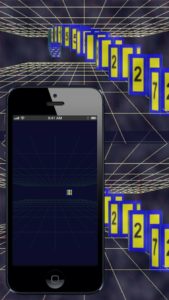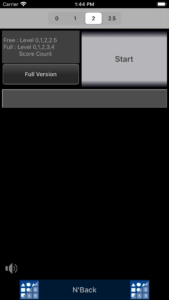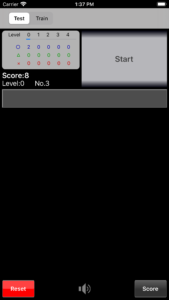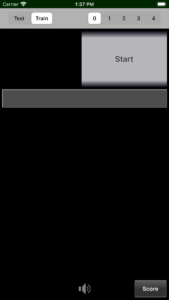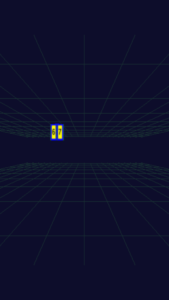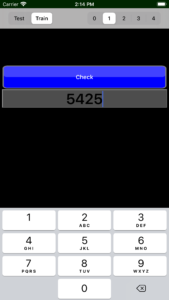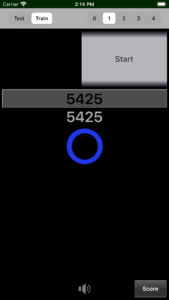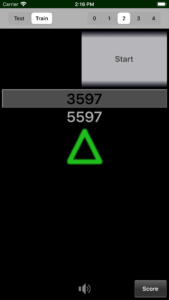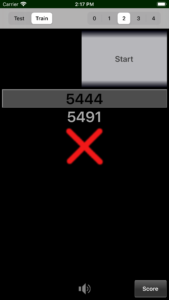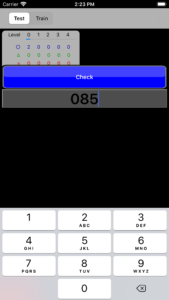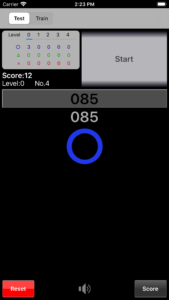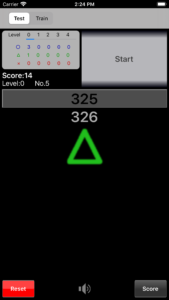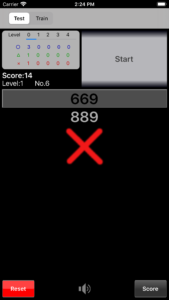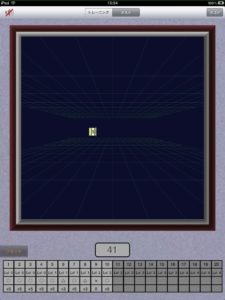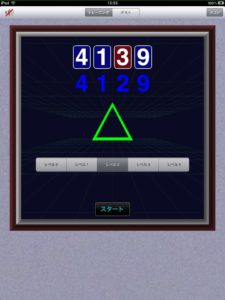3 ways to improve Dynamic and Kinetic visual acuity
Kinetic visual acuity is the second most important factor for athletes after physical and mental.
The training methods for kinetic and dynamic visual acuity are introduced below.
- 1 What is dynamic and kinetic visual acuity?
- 2 Dynamic visual acuity training method
- 3 Kinetic visual acuity training method
- 4 iPhone app to train Kinetic visual acuity
- 5 iPad app to train Kinetic visual acuity
- 6 Android app to train Kinetic visual acuity
What is dynamic and kinetic visual acuity?
Visual acuity is classified into static visual acuity and dynamic visual acuity.
Static visual acuity is the ability to see a still object.
The visual acuity test using the Landolt ring, which is performed in medical examinations, tests the static visual acuity.
Dynamic and kinetic visual acuity is the ability to see moving objects.
| Dynamic visual acuity | Vertical and horizontal vision |
| Kinetic visual acuity | Depth vision |
Sports Vision
There is sports vision as a classification method of visual acuity.
According to the Sports Vision Association, sports vision is classified into the following 8 items.
In particular, in baseball hitting, Kinetic and Dynamic visual acuity are most important.
1.Static vision
Sight to see what is stationary. (Measured by general visual acuity test)
2.Kinetic visual acuity:KVA
Visual acuity for an object that moves in the depth direction.
3.Dynamic visual acuity:DVA
Visual acuity for an object that moves vertically and horizontally.
4.Eye movement
Ability to move the line of sight quickly and smoothly.
5.Contrast sensitivity
Ability to identify subtle differences in brightness.
6.Deep vision (sense of distance)
Ability to recognize relative perspectives.
7.Instantaneous eyesight
Ability to instantly recognize visual information.
8.Eye-hand coordination
Reflexes related to vision.
3 ways to improve Dynamic and Kinetic visual acuity
- Dynamic visual acuity training method
- Kinetic visual acuity training method
- iPhone app to train Kinetic visual acuity
Dynamic and Kinetic visual acuity does not improve just by training the eye muscles. It is necessary to train together with the “brain image processing function”.
However, that does not make the training method more complicated.
All you have to do is create a scene that uses Dynamic or Kinetic visual acuity and repeat the training.
Dynamic visual acuity training method
This training method does not perform vertical training, but it is effective for horizontal training.
The good thing about this training method is that you don’t need to be prepared. You can train any time you are traveling by train.
Kinetic visual acuity training method
This method of training is very effective, but it also requires tedious preparations and a pitcher to go out with. It is also difficult to control conditions such as ball speed, rotation speed, and rotation direction.
If the ball speed is too fast or the rotation speed is too high, the training will have no effect, and if it is too slow, it will have no effect.
It is said that you can train more effectively by using shutter glasses. Shutter glasses are glasses with a flash effect that open and close the shutter at a high speed with a liquid crystal.
iPhone app to train Kinetic visual acuity
“Kinetic Visual Acuity” is iPhone app that trains Kinetic visual acuity.
iPhone app “Kinetic Visual Acuity”
“Kinetic Visual Acuity” is an iPhone app that trains Kinetic visual acuity, but it is also effective for Dynamic visual acuity.
Free and Paid versions
There are Free and Paid versions of “Kinetic Visual Acuity”.
The difference between the free version and the paid version is the presence or absence of advertisement, the difficulty level, and the presence or absence of test mode.
| Free version | Paid version |
|---|---|
| With ads | No ads |
| Difficulty level=0~2.5 | Difficulty level=0~4 |
| No test mode | Test mode available |
How to use
In the paid version “Kinetic Visual Acuity”, you can select “Test mode” or “Training mode”.
Mode switching
Use the selection box (test / train) in the upper left of the startup screen to switch between “test mode” and “training mode”.
You can practice by switching to “Training Mode” even during the test.
Training mode
In training mode, you can practice the same level again and again.
It’s easy to use, just select a difficulty level and tap the start button.
The moving speed and rotating speed of the hexagonal pillar are determined by the difficulty level.
The trajectory of the hexagonal pillar changes randomly every time, like baseball pitching.
The order of the numbers does not matter. If 2124 is correct, both 1242 and 1224 are correct.
Test mode
In Test mode, 5 difficulty levels from 0 to 4 are tested, 5 times each, 25 times in total.
The points that can be added are 4 points for ◯, 2 points for △, 0 points for ☓, and the maximum score is 100 points.
It’s easy to use in test mode, just repeat the test “Tap the start button, read the number on the hexagonal pillar and answer” 25 times. Since it is not a time trial, you can interrupt it on the way.
When the test is complete, your score will be recorded.
Reset test
If you want to cancel the test, you can reset it by tapping the red reset button at the bottom left of the screen.
Score
To check / delete the test score, tap the score button at the bottom right of the screen.
Sound effect on / off
To turn off the sound effect, tap the speaker button at the bottom center of the screen. The sound effect switches on / off each time you tap it.
iPad app to train Kinetic visual acuity
“Kinetic Visual Acuity HD” is an iPad app of “Kinetic Visual Acuity”.
The usage is basically the same as the iPhone app “Kinetic Visual Acuity”, but the score display is quite easy to understand.
Also, in the iPad version, screen transition from the startup screen to the screen where the hexagonal pillar rotates does not occur.
iPad app “Kinetic Visual Acuity HD”
Android app to train Kinetic visual acuity
android app ‘Kinetic Visual Acuity Free’ Google Play , Referral site
android app ‘Kinetic Visual Acuity’ Google Play , Referral site
